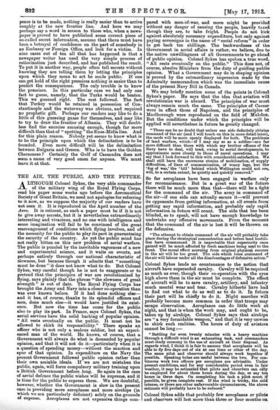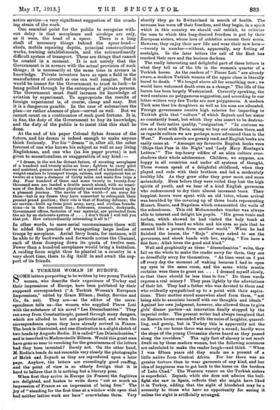THE AIR, THE PUBLIC, AND THE FUTURE.
ALTHOUGH Colonel Sykes, the very able commander of the military wing of the Royal Flying Corps, read his paper some weeks ago before the Aeronautical Society of Great Britain, we need not apologise for referring to it now, as we suppose the majority of our readers have not seen it. It is reproduced in the April number of the Aero. It is reticent, as such a paper must be if it is not to give away secrets, but it is nevertheless extraordinarily interesting and vivacious, and no one with intelligence and some imagination will fail to be convinced of the great rearrangement of conditions which flying involves, and of the necessity for the public to play its part in guaranteeing the security of the country. As yet the public mind has not really bitten on this new problem of aerial warfare. The public is puzzled by the inevitable vagueness of a new and experimental science, and it waits on events, not perhaps entirely through our national characteristic of slowness, but because though it admits that " something must be done " it does not know what to do. But Colonel Sykes, very careful though he is not to exaggerate or to pretend that the principles of war are revolutionized by flying, says plainly that the phrase "the slowness of great strength" is out of date. The Royal Flying Corps has brought the Army and Navy into a closer co-operation than was ever known before. If it had done nothing else— and it has, of course, thanks to its splendid officers and men, done much else—it would have justified its exist- ence. But now the time has come for the public also to play its part. In France, says Colonel Sykes, the aerial services have the solid backing of popular opinion. " All rests eventually on the public. It must not be allowed to shirk its responsibility." There speaks an officer who is not only a zealous soldier, but an experi- enced man of the world. He knows, of course, that a Government will always do what is demanded by popular opinion, and that it will not do it—particularly when it is a question of spending money—without the sanction and spur of that opinion. In expenditure on the Navy the present Government followed public opinion rather than their own amiable ideals. If we are not mistaken the public, again, will force compulsory military training upon a British Government before long. So again in the case of aerial defence the public wishes will be supreme, and it is time for the public to express them. We are doubtful, however, whether the Government is slow in the present case in providing more aeroplanes and more airships (in which we are particularly deficient) solely on the grounds of expense. Aeroplanes are not expensive things com-
pared with men-of-war, and more might be provided without any danger of causing the people, heavily taxed though they are, to take fright. People do not kick against absolutely necessary expenditure, but only against paying sovereigns in the name of " social reform" in order to get back ten shillings. The backwardness of the Government in aerial affairs is rather, we believe, due to the native unwillingness of all Governments to go ahead of public opinion. Colonel Sykes has spoken a true word. " All rests eventually on the public." This does not, of course, absolve Ministers from the duty of guiding public opinion. What a Government may do in shaping opinion is proved by the extraordinary impression made by the Admiralty memorandum which was the immediate cause of the present Navy Bill in Canada..
We may briefly mention some of the points in Colonel Sykes's paper. He says that the idea that aviation will revolutionize war is absurd. The principles of war must always remain much the same. The principles of Caesar were in effect those of Napoleon, and the principles of Marlborough were reproduced on the field of Mukden. But the conditions under which the principles will be applied will nevertheless in future be greatly changed.
"There can be no doubt that unless one side definitely obtains command of the air (and I will touch on this in more detail later), the cards will be more openly displayed for both. The problems of land warfare, which—if I may say so as a soldier—are far more difficult than those with which my brother officers of the Navy have to deal, will tend, owing to aerial developments, to approximate more closely to those of naval operations. I may say that I look forward to this with considerable satisfaction. We shall still have the enormous strains of mobilization, of supply difficulties, of lines of communication, of weary legs, but the `fog of war,' the `hill' behind which Wellington could not see, will, to a certain extent, be quietly and quickly removed."
So far aeroplanes have been engaged in warfare only for reconnaissance. But in a great war of the future there will be much more than that—there will be a fight for the command of the air. The army in command of the air—if one side can actually secure it—will prevent its opponents from getting information, at all events from: getting any rapid information, and probably only rapid information in future will count. The side that has been blinded, so to speak, will not have enough knowledge to undertake any offensive movements. From the moment that the command of the air is lost it will be thrown on. the defensive.
"The attempt to obtain command of the air will probably take place during the strategical concentration and before land hostili- ties have commenced. It is improbable that superiority once gained will be much affected by fresh machines being sent to the front. The moral effect accruing from original physical success in the air will be too great. The side which loses command of the air will labour under all the disadvantages of defensive action."
Colonel Sykes lends no countenance to the notion that aircraft have superseded cavalry. Cavalry will be required as much as ever, though their co-operation with the eyes high above them in the air must be complete. The effect of aircraft will be to save cavalry, artillery, and infantry much mental wear and tear. Cavalry hitherto have had to find out what to do as well as to do it. In future their part will be chiefly to do it. Night marches will probably become more common in order that troops may escape observation. Aeroplanes can do little work at night, and that is when the work may, and ought to be, taken up by airships. Colonel Sykes says that airships are " a very formidable weapon," and that it is very unwise to shirk such realities. The hours of duty of aviators cannot be long :- "Battling for even twenty minutes with a heavy machine through a difficult wind is an exhausting task, and commanders must study economy in the use of aircraft at their disposal. As regards wind, I think it is fair to assume that aeroplanes will be able to fly five days out of six at one time or other of the day. The same pilot and observer should always work together if possible. Speaking tubes are useful between the two. For con- tinuous work two officers per aeroplane are advisable. Under present conditions, and for any considerable period, even in fair weather, it may be estimated that pilots and obseriers can only be employed for about three hours during tho day, or say ten hours in three days. On completing his task a pilot must; if possible, be given complete rest. If the wind is tricky, the cold intense, or there are other unfavourable circumstances, the above estimate will probably have to be reduced."
Colonel Sykes adds that probably few aeroplanes or pilots and observers will last more than three or four months on active service—a very significant suggestion of the crush- ing strain of the work.
One essential point for the public to recognize with- out delay is that aeroplanes and airships are only, as it were, the head of a spear. There is a long shaft of necessary things behind the spear-head- sheds, mobile repairing depOts, principal constructional works, training establishments, and the extraordinarily difficult system of transport. These are things that cannot be created in a moment. It is not merely that the Government is in arrears with the actual provision of such things ; it is necessarily at the same time in arrears in knowledge. Private inventors have as open a field in the manufacture of aircraft as one can well imagine. But it would be insane for the Government to trust to luck—to being pulled through by the enterprise of private persons. The Government must itself increase its knowledge of aviation by experiment. To appropriate the results of foreign experiment is, of course, cheap and easy. But it is a dangerous gamble. In the case of submarines the plan—or rather absence of plan—served us well. But we cannot count on a continuance of such good fortune. It is, in fine, the duty of the Government to buy its knowledge, and the duty of the public is to insist that this shall be done.
At the end of his paper Colonel Sykes dreams of the future, and his dream is indeed enough to make anyone think furiously. For his " dream " is, after all, the sober forecast of one who knows his subject as well as any living Englishman, and one who (as his paper proves) is not given to sensationalism or exaggeration of any kind :-
" I dream, in the not far distant future, of scouting aeroplanes of a hundred and twenty miles an hour ; fighters to carry pilot and assistant, gunner and observer at a speed of a hundred miles ; weight-caniers to transport troops, rations, and equipment ten or twelve at a time a distance of thirty miles and make five trips a day. Four hundred of these and some twenty to twenty-four thousand men are landed a double march ahead, with no weari- ness of the flesh, but rather physically and mentally braced up by a pleasant journey. The navies of the world—I am sorry for them—but in my dream they have somewhat to relinquish their present proud position ; their rdle is that of floating defence ; the air service—built up from joint army, navy, and civilian founda- tions—ia in the foremost line ; fortresses, arsenals, dockyards, Government offices, factories of war material, are protected from the air by an elaborate system of . . . I don't think I will tell you that yet. How extraordinarily interesting it all is !"
In other words, to mere aerial reconnaissance there will be added the practice of transporting large bodies of troops by aeroplane. Aerial ferry boats, for instance, will be able to fly backwards and forwards across the Channel, each of them dumping down its quota of twelve men. Fewer than a hundred aeroplanes would bring a battalion. A raiding force might thus be planted in a country in a very short time, there to dig itself in and await the sup- port of its friends.











































 Previous page
Previous page